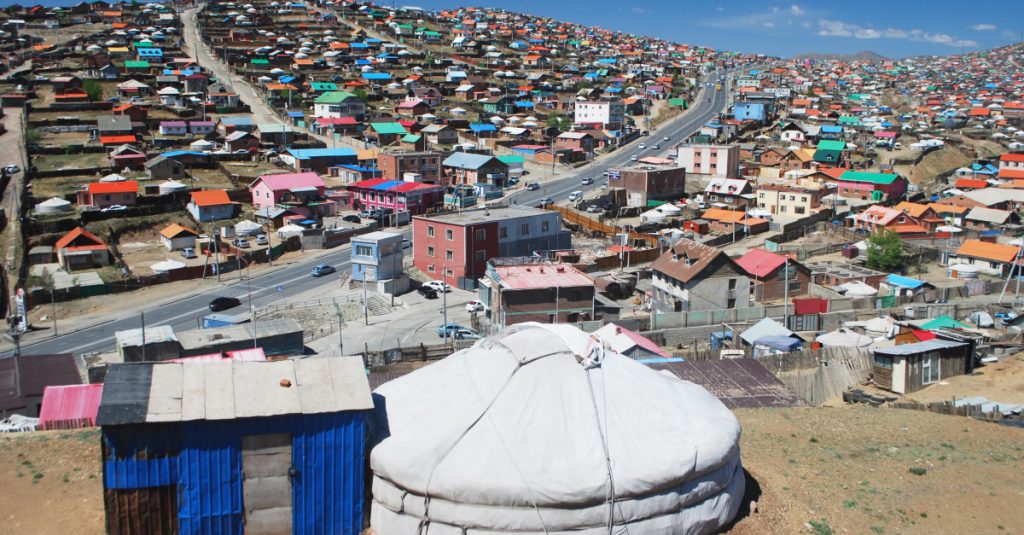Ulaanbaatar is Mongolia’s capital and leading city. Its ability to thrive and adapt to its citizens’ needs is crucial to the development of the country as a whole. In recognition of this, Mongolian officials have collaborated with The Hague Academy for a crucial training on citizen engagement, local economic development and smart technology.

Ger district, Ulaanbaatar. Credits: UCL The Bartlett, 2020.
Ulaanbaatar, Mongolia’s capital, hosts nearly half of Mongolia’s 3.2 million people. As rural Mongolians continue to move to the city, Ulaanbaatar struggles to provide needed services. Now, approximately sixty per cent of Ulaanbaatar’s population lives in its periphery, a mass of informal settlements around the urban centre. Municipal officials have sought to better provide public service to these fringe communities by increasing public participation in its local spending decisions, both as a way to understand citizen needs and help fund new initiatives.
In June 2022, a delegation from Ulaanbaatar approached The Hague Academy to collaborate on their local development ambitions. The Deputy Mayor of Ulaanbaatar and The Hague Academy drafted a memorandum of understanding to coordinate a tailor-made training-of-trainers on citizen engagement, local economic development, and smart technology -all to support Ulaanbaatar’s transformation into a dynamic, smart city. Twenty-two Mongolian practitioners joined us for the first five-day training on October 31st, 2022.
With the first session over, we spoke with Enkhbold Buyanbadrach, Head of the Center for Human Resources Development at Ulaanbaatar’s Municipal Administration. As Enkhbold explains, a smart city is one that is reactive to citizens’ needs, and so any future in which Ulaanbaatar develops smart infrastructure is one where citizen participation blossoms. Providing crucial context, Enkhbold helps us understand what his colleagues have already done to cultivate citizen participation in his city, and where room for growth lies.
Breaking Ground with the Local Development Fund
Mongolia’s Integrated Budget Law, which came into effect in January 2013, was the first law to prescribe public consultation in government decision-making. The law was arguably the country’s first attempt to decentralise development planning to local government. A significant outcome of the law was the creation of the Local Development Fund (LDF), which provides a forum for citizens to directly voice their opinion on local expenditures.
Although budget management remains highly centralised in Mongolia, the percentage of the national budget dedicated to the LDF is significant -at 5% of the national GDP. LDF projects are prioritised by citizens through an annual, paper-based survey and selected through a process of community consultations. Past LDF projects have included sidewalks, playgrounds, citizen halls, street lighting, waste collection points, and water wells.
The Local Development Fund presents Mongolian citizens with an important opportunity for participatory democracy, but its impact has been blunted by widespread unfamiliarity with the law and its provisions.
Room for Growth
Enkhbold explains how the Local Development Fund still has crucial design limitations. These limitations revolve around decision-making feedback and transparency after community consultations are made. Districts hold the final decision on where LDF allocations are made, and they are given the final authority to select projects based on their own development policies and priorities. With opacity on why decisions are made, and whether or not their considerations were taken into account, community members are often disenfranchised from the decision-making process. This “thwarts the LDF’s public-participation provisions”, says Enkhbold, “We often do not let people know what we will do next year, and do not let them know if it will be accepted or not, whether it was implemented or useful. This raises doubts [on the process]”.
The Path to a Flourishing Ulaanbaatar
Inversely, international organisations have now been working with the Municipality of Ulaanbaatar for years to improve the LDF project cycle, streamline the management of citizen input, and increase the transparency of LDF decision-making.
The Hague Academy is one such organisation, providing lessons on not just citizen participation, but on how citizen participation can fuse with local entrepreneurship to further local development. Importantly, as Enkhbold explains, is the data-driven, trial-and-error approach that municipal leaders can adopt. While implementing feedback loops in citizen participation, reiterative processes can form better, more responsive policies.
Finally, Enkhbold emphasises how crucial supporting local entrepreneurship is to the equal growth and prosperity of Ulaanbaatar:
“I believe that having an atmosphere that understands and supports business owners who wish to increase jobs can give people who are currently doing business the motivation and encouragement to expand their business and start a new business”.
Enkhbold predicts that this would be the foundation for a more prosperous economy, one that can help include the city’s periphery through citizen engagement, creating a positive feedback loop with an economically dynamic citizenry: “if this is done… as task-payers increase, the city’s revenue will increase [allowing for more municipal support]. And so, the capital city of Ulaanbaatar will live in the true meaning of the name ‘White Fairy of Asia!’”
Stay Tuned! The second training will take place in March 2023 where participants will be certified as trainers. Stay tuned to find out more.
Related courses
We offer a diversity of courses throughout the year. Here are several other courses you might like.


